《“一国两制”下香港的民主发展》白皮书(双语全文)
新华网 2021-12-20 14:18

二、回归祖国开启了香港民主的新纪元
II. The Return of Hong Kong to China Ushered in a New Era for Democracy
二十世纪七十年代末八十年代初,中国政府决定收回香港,恢复对香港行使主权,实行“一国两制”、“港人治港”、高度自治的方针,由此擘画了香港回归后民主发展的蓝图,开启了“一国两制”下香港民主的新纪元。
In the late 1970s and early 1980s, the Chinese government decided to resume the exercise of sovereignty over Hong Kong, and announced the policy of One Country, Two Systems, under which Hong Kong would be governed by the people of Hong Kong, exercising a high degree of autonomy. A blueprint for developing democracy in post-1997 Hong Kong was drawn up.
(一)中国的国体政体决定了香港回归后必然实行民主
1. China’s State and Political Systems Determined that Hong Kong Would Establish a System of Democracy After Its Return to
China
中国宪法规定,国家的一切权力属于人民,人民行使国家权力的机关是全国人民代表大会和地方各级人民代表大会。全国人民代表大会和地方各级人民代表大会都由民主选举产生,对人民负责,受人民监督。中央和地方各级行政、监察、审判、检察机关都由人民代表大会产生,对其负责,受其监督,充分体现民主原则。根据“一国两制”方针,香港特别行政区作为直辖于中央人民政府的地方行政区域,其政权的组织与运行必然同样遵循民主原则,实行民主制度;同时,香港特别行政区可以根据实际情况建设具有自身特色的民主制度。
It is stipulated in China’s Constitution that all power in the People’s Republic of China (PRC) belongs to the people. The organs through which the people exercise state power are the National People’s Congress (NPC) and the local people’s congresses at all levels. The NPC and the local people’s congresses are established through democratic election and are accountable to the people and subject to their oversight. All national and local administrative, supervisory, adjudicatory and prosecuting organs are created by the people’s congresses and are answerable to them and subject to their oversight, in full accordance with the principles of democracy. According to the policy of One Country, Two Systems, Hong Kong is a special administrative region directly under the Central People’s Government. In common with all other parts of China, its government is organized on the basis of democratic principles, as are its functions. At the same time, Hong Kong can develop democracy with its own characteristics in light of its actual conditions.
二十世纪八十年代初,中国共产党和中国政府根据香港的实际情况,形成了解决香港问题的十二条基本方针政策(注1),系统规划了香港回归后的政治、经济、社会、文化、对外事务等各方面的政策和制度框架,成为“一国两制”方针的核心内容。其中第四条明确香港回归后“特别行政区政府由当地人组成。主要官员在当地通过选举或协商产生,由中央人民政府委任”。这包含了对香港特别行政区成立后的民主安排。实行“港人治港”、主要官员在当地通过选举或协商产生,这是在英国殖民统治下根本不可能做到的。
In the early 1980s, the CPC and the Chinese government laid down
12 basic policies on the future status of Hong Kong, known as the 12 Policies.1 These 12 Policies set out an overall policy and institutional framework for Hong Kong after its return to China, covering political, economic, social and cultural issues, external affairs and other fields. They constitute the core elements of the One Country, Two Systems policy. The fourth basic policy stated that the government of the HKSAR would be composed of local inhabitants, and that principal officials would be selected by election or through consultations held locally and be appointed by the Central People’s Government. It thus outlined steps for establishing a system of democracy in post-1997 Hong Kong. This measure – ensuring that Hong Kong is governed by the people of Hong Kong and that the principal officials are elected or selected by means of consultation – was never considered under British colonial rule.
(二)中国政府坚定维护在香港特别行政区发展民主的既定立场
2. The Chinese Government Remains Committed to Developing Democracy in the HKSAR
1984年12月19日,中英两国政府在北京签署《中英联合声明》,其核心内容是确认中国政府1997年7月1日对香港恢复行使主权、英国政府同日将香港交还给中国,并对过渡期作出安排。该声明旨在解决英国把香港交还给中国的问题,而非解决香港回归中国后实行什么政治体制包括选举制度的问题。其中第三条第四项申明“香港特别行政区政府由当地人组成。行政长官在当地通过选举或协商产生,由中央人民政府任命”,附件一明确“香港特别行政区政府和立法机关由当地人组成”“香港特别行政区立法机关由选举产生”,这两处表述是《中英联合声明》涉及香港选举问题的全部内容,根本没有“普选”“民主”的字眼。
On December 19, 1984, the Sino-British Joint Declaration was signed in Beijing. The document specified that the government of the People’s Republic of China would resume the exercise of sovereignty over Hong Kong with effect from July 1, 1997 and that the government of the United Kingdom would restore Hong Kong to the PRC with effect from July 1, 1997. The document also outlines the steps to be taken during the transitional period before Hong Kong’s return to China. The purpose was not to determine what political system would be implemented in Hong Kong after the handover, and certainly not to define the precise nature of the electoral system.
Paragraph 4 of Article 3 of the Sino-British Joint Declaration reads: “The Government of the Hong Kong Special Administrative Region will be composed of local inhabitants. The Chief Executive will be appointed by the Central People’s Government on the basis of the results of elections or consultations to be held locally.”
Annex I to the Sino-British Joint Declaration further specifies that
“the government and legislature of the Hong Kong Special Administrative Region shall be composed of local inhabitants” and that “the legislature of the Hong Kong Special Administrative Region shall be constituted by elections.”
These are the sole provisions of the Sino-British Joint Declaration concerning elections in Hong Kong. No mention is made of universal suffrage or democracy.
香港回归后实行什么样的政治体制包括选举制度完全是中国内政。中国政府在制定基本法的过程中,从国家全局和香港长远发展着眼,主动规定了香港特别行政区最终实现行政长官和立法会全部议员由普选产生的目标。那种声称“双普选”是英国为香港争取来的说法,完全违背历史事实。至于所谓中国政府“违反”《中英联合声明》的说法,不仅罔顾事实,更是对中国的污蔑抹黑。相反,英方在《中英联合声明》签署后,单方面改变对华政策,处心积虑策划和实施了一连串违反声明精神和中英双方有关协议、共识的行动,包括“两局共识”“居英权计划”“人权法案”“政改方案”以及大规模修改香港原有法律等等。2020年7月以来,英方出台关于香港居民申领英国国民(海外)(BNO)签证的新政策,推出所谓BNO合资格者移民英国的新路径,再次公然违反《中英联合声明》的原则精神和两国有关谅解共识。
It is for China to decide what political and electoral systems will be adopted in Hong Kong after its return. During the formulation of the Basic Law, keeping in mind the national interests and the long-term development of Hong Kong, the Chinese government set as the ultimate goal that the Chief Executive of the HKSAR will be selected and the legislature constituted by universal suffrage. The assertion that “the UK secured universal suffrage for Hong Kong” has no factual basis.
The allegations that China has violated the Sino-British Joint Declaration are baseless. In reality, the British government unilaterally altered its policy towards China after the declaration was signed. It made massive changes to Hong Kong laws prior to the return, and since the return it has continued to interfere, with actions that contravene the Sino-British Joint Declaration and other agreements between China and the UK.
Prior to the return, these included creating a proposal for political reform (the OMELCO Consensus), implementing the British Nationality Selection Scheme, announcing an electoral reform package for 1994/1995, and enacting the Hong Kong Bill of Rights Ordinance.
In July 2020, the British government issued a new policy for Hong Kong residents to apply for a British National (Overseas) visa as a means for them to emigrate to the UK. The policy was another flagrant violation of the principles set in the Sino-British Joint Declaration and relevant agreements between China and the UK.
香港回归后,中国政府治理香港的宪制法律依据是中国宪法和香港基本法。英国对回归后的香港无主权、无治权、无监督权,无权对香港事务进行任何形式的干预。那些打着“民主”的幌子,以所谓“监督”《中英联合声明》实施为借口,动辄通过本国立法和单边制裁干涉中国香港事务的行径,既是对国际法和国际关系准则的肆意践踏,也是对“一国两制”成功实践事实的蓄意歪曲,更是对香港民主发展的粗暴干扰和破坏。
Since Hong Kong’s return to China, China’s Constitution and the Basic Law of the HKSAR have been the foundations underpinning the Chinese government’s governance of the region. The UK has no sovereignty, power of administration, or right of supervision over post-1997 Hong Kong, nor does it have the right to intervene in Hong Kong affairs in any form. Legislative interventions and imposition of sanctions, in the guise of “democracy” and on the pretext of overseeing the implementation of the Sino-British Joint Declaration, flout international law and international rules, disrupt the successful practice of One Country, Two Systems, and interfere with and undermine the development of democracy in Hong Kong.
(三)宪法和基本法全面构建了香港特别行政区的民主制度
3. The Constitution and the Basic Law Established the System of Democracy in the HKSAR
——宪法和基本法赋予中央政府建立和发展香港特别行政区民主制度的宪制权力和责任。宪法第三十一条规定:“国家在必要时得设立特别行政区。在特别行政区内实行的制度按照具体情况由全国人民代表大会以法律规定。”1985年4月10日,全国人民代表大会决定成立香港特别行政区基本法起草委员会。7月1日,由59名内地和香港各界代表性人士组成的基本法起草委员会正式成立并开始工作。在香港社会各界人士的共同参与下,该委员会历时四年零八个月完成了基本法的起草工作。1990年4月4日,第七届全国人民代表大会第三次会议通过基本法,以国家基本法律的形式将中央政府对香港的基本方针政策制度化、法律化,为香港特别行政区民主制度的建立和发展提供了宪制性法律依据,也明确了中央政府主导和决定香港特别行政区民主发展的宪制责任。
– The Constitution and the Basic Law accord the constitutional powers and duties to the central government to establish and develop democracy in the HKSAR
It is stipulated in Article 31 of China’s Constitution that “The state may establish special administrative regions when necessary. The systems instituted in special administrative regions shall, in light of specific circumstances, be prescribed by laws enacted by the National People’s Congress.”
The NPC decided to set up a drafting committee for the HKSAR Basic Law on April 10, 1985. On July 1, the drafting committee, consisting of 59 mainland and Hong Kong members, was formally established. Representatives from various sectors of Hong Kong society were involved in drafting the Basic Law, a process lasting four years and eight months.
The Basic Law was adopted at the Third Session of the Seventh NPC on April 4, 1990. It codifies the central government’s basic policies towards Hong Kong in the form of a national law and specifies related institutional steps. The Basic Law provides the constitutional basis for establishing and developing democracy in Hong Kong. It also accords the central government constitutional powers and duties to direct and make decisions on the development of democracy in the HKSAR.
宪法和基本法共同构成香港特别行政区的宪制基础,赋予中央对香港特别行政区的全面管治权,既包括中央直接行使的权力,也包括授权香港特别行政区依法实行高度自治以及对特别行政区高度自治的监督权。中央直接行使的权力包括设立特别行政区、决定特别行政区实行的制度、组建特别行政区政权机构、管理与特别行政区有关的外交事务、管理特别行政区的防务、任命行政长官和主要官员、对特别行政区立法的备案审查、修改和解释基本法等方面的宪制权力。其中就包括决定香港特别行政区实行什么样民主制度的权力。
The Constitution and the Basic Law together create the constitutional foundations underpinning the HKSAR. They grant the central authorities overall jurisdiction over the region, detail the powers directly exercised by the central authorities, empower the HKSAR to exercise a high degree of autonomy, and confirm the central authorities’ right to supervise the exercise of this autonomy. The direct powers of the central authorities are to establish the HKSAR, decide on its systems, organize its government, manage foreign affairs and defense affairs related to the HKSAR, appoint the Chief Executive and principal officials, archive and review legislation of the HKSAR, and amend and interpret the Basic Law. The central authorities also exercise the power to decide on the system of democracy in the region.
——基本法规定了香港特别行政区民主制度的主要内容及未来发展的路径和原则。基本法第四十五条和第六十八条规定了香港特别行政区民主制度的核心内容及其发展所必须遵循的原则。基本法原附件一和附件二分别规定了香港回归后前十年行政长官和立法会产生的具体办法,以及2007年以后对行政长官和立法会产生办法的修改程序。1990年4月4日与基本法同时通过的《全国人民代表大会关于香港特别行政区第一届政府和立法会产生办法的决定》,对香港特别行政区第一届政府和立法会的产生办法作出了具体规定。香港特别行政区实行以行政长官为核心的行政主导体制,行政机关和立法机关既互相制衡又互相配合,司法机关独立行使审判权。基本法起草委员会在《关于〈中华人民共和国香港特别行政区基本法(草案)〉及其有关文件的说明》中指出,香港特别行政区的政治体制,要符合“一国两制”的原则,要从香港的法律地位和实际情况出发,以保障香港的繁荣稳定为目的。为此,必须兼顾社会各阶层的利益,有利于资本主义经济的发展;既保持原政治体制中行之有效的部分,又要循序渐进地逐步发展适合香港情况的民主制度。这进一步阐释了香港特别行政区民主发展所应当遵循的原则。
– The Basic Law provides the core components of democracy in the HKSAR and the pathway and principles for its future development
Article 45 and Article 68 of the Basic Law provide the core components of democracy in Hong Kong and the principles for implementation. The original versions of Annex I and Annex II of the Basic Law laid out the methods for selecting the Chief Executive and for forming the Legislative Council in the first decade after Hong Kong’s return to China, as well as the processes for amending these methods after 2007. The Decision of the National People’s Congress on the Method for the Formation of the First Government and the First Legislative Council of the Hong Kong Special Administrative Region was adopted on April 4, 1990 together with the Basic Law, specifying the method to be used.
Hong Kong practices an executive-led system with the Chief Executive at its core. Under this system, there are checks and balances and coordination between the executive and legislative branches, and the judiciary exercises its power independently. In the Explanations on the Basic Law of the Hong Kong Special Administrative Region of the People’s Republic of China (Draft) and Its Related Documents, the Drafting Committee for the Basic Law underlined that to ensure the prosperity and stability of Hong Kong, the political system should conform to the principle of One Country, Two Systems and respect the legal status and realities of the region. It should accommodate the interests of all sectors of Hong Kong society and facilitate Hong Kong’s economic growth under capitalism. The best practices of Hong Kong’s previous political system should be maintained, together with an orderly and phased development of democracy. These are the principles for developing democracy in the region.
基本法第四十五条第二款规定,行政长官的产生办法根据香港特别行政区的实际情况和循序渐进的原则而规定,最终达至由一个有广泛代表性的提名委员会按民主程序提名后普选产生的目标;第六十八条第二款规定,立法会的产生办法根据香港特别行政区的实际情况和循序渐进的原则而规定,最终达至全部议员由普选产生的目标。这为香港特别行政区民主发展指明了“双普选”的方向。
Paragraph 2 of Article 45 of the Basic Law provides:
“The method for selecting the Chief Executive shall be specified in the light of the actual situation in the Hong Kong Special Administrative Region and in accordance with the principle of gradual and orderly progress. The ultimate aim is the selection of the Chief Executive by universal suffrage upon nomination by a broadly representative nominating committee in accordance with democratic procedures.” Paragraph 2 of Article 68 provides:
“The method for forming the Legislative Council shall be specified in the light of the actual situation in the Hong Kong Special Administrative Region and in accordance with the principle of gradual and orderly progress. The ultimate aim is the election of all the members of the Legislative Council by universal suffrage.”
This sets dual universal suffrage as the ultimate goal in developing democracy in Hong Kong.
——基本法贯彻了以爱国者为主体的“港人治港”原则。基本法第二条规定,全国人大授权香港特别行政区依照基本法的规定实行高度自治,享有行政管理权、立法权、独立的司法权和终审权。第三条规定,香港特别行政区的行政机关和立法机关由香港永久性居民依照基本法有关规定组成。第一百零四条规定,香港特别行政区行政长官、主要官员、行政会议成员、立法会议员、各级法院法官和其他司法人员在就职时必须依法宣誓拥护中华人民共和国香港特别行政区基本法,效忠中华人民共和国香港特别行政区。这些规定体现了邓小平同志强调的“相信香港的中国人能够治理好香港”“必须由以爱国者为主体的港人来治理香港”的精神,明确了“港人治港”的界线和标准。实行“一国两制”下的“港人治港”、高度自治,由爱国的香港人治理香港,这是香港最大的民主。
– The Basic Law embodies the principle of Hong Kong people governing Hong Kong, with patriots at the core
Article 2 of the Basic Law provides:
“The National People’s Congress authorizes the Hong Kong Special Administrative Region to exercise a high degree of autonomy and enjoy executive, legislative and independent judicial power, including that of final adjudication, in accordance with the provisions of this Law.”
Article 3 continues:
“The executive authorities and legislature of the Hong Kong Special Administrative Region shall be composed of permanent residents of Hong Kong in accordance with the relevant provisions of this Law.”
Article 104 provides:
“When assuming office, the Chief Executive, principal officials, members of the Executive Council and of the Legislative Council, judges of the courts at all levels and other members of the judiciary in the Hong Kong Special Administrative Region must, in accordance with law, swear to uphold the Basic Law of the Hong Kong Special Administrative Region of the People’s Republic of China and swear allegiance to the Hong Kong Special Administrative Region of the People’s Republic of China.”
These provisions of the Basic Law encapsulate the principle of Hong Kong people governing Hong Kong, as expressed in the words of former Chinese leader Deng Xiaoping: “We are confident that our fellow Chinese in Hong Kong can govern Hong Kong well… Hong Kong must be governed by the people of Hong Kong, with patriots at the core.” These statements set the parameters for Hong Kong’s governance under the policy of One Country, Two Systems, which underpin full democracy in Hong Kong.
——基本法赋予了香港居民广泛的民主权利和自由。根据基本法,香港特别行政区永久性居民依法享有选举权和被选举权;香港居民享有言论、新闻、出版、结社、集会、游行、示威的自由,以及基本法和香港特别行政区法律保障的其他权利和自由;《公民权利和政治权利国际公约》《经济、社会与文化权利的国际公约》和国际劳工公约适用于香港的有关规定继续有效,通过香港特别行政区的法律予以实施。基本法还规定,香港特别行政区居民中的中国公民依法参与国家事务的管理。非中国籍的香港特别行政区永久性居民也依法享有广泛的政治权利,包括选举权和被选举权。这种民主开放程度世所罕见。
– The Basic Law grants extensive democratic rights and freedoms to Hong Kong residents
Under the Basic Law, permanent residents of the HKSAR have the right to vote and the right to stand for election in accordance with the law, and Hong Kong residents have freedom of speech, freedom of the press and publication, freedom of association, assembly, procession and demonstration, and other rights and freedoms provided for under the Basic Law and the laws of the HKSAR. The provisions of the International Covenant on Civil and Political Rights, the International Covenant on Economic, Social and Cultural Rights, and international labor conventions as applicable to Hong Kong remain in force and shall be implemented through the laws of Hong Kong.
In addition, the Basic Law stipulates that Chinese citizens who are HKSAR residents are entitled to participate in the management of state affairs in accordance with the law. Furthermore, permanent residents of the HKSAR who are not of Chinese nationality also enjoy extensive political rights, including the right to vote and the right to stand for election. By any standard, Hong Kong’s system of democracy is highly open and inclusive.
(四)中国政府排除干扰组建香港特别行政区政权机构
4. The Chinese Government Put an End to Interference and Established the Governance Structure for the HKSAR
——争取实现立法机关“直通车”安排。为实现香港平稳过渡和政权顺利交接,使香港特别行政区民主制度在回归之时就能有效运作,中国政府经与英国政府协商,对香港特别行政区第一届立法会的产生办法作出了特殊安排:原香港最后一届立法局议员,如符合全国人大有关决定和基本法的规定,经确认可成为香港特别行政区第一届立法会议员。这就是“直通车”安排。但是,港英当局1992年10月单方面抛出关于1994/1995年选举安排的“三违反”“政改方案”。中国政府坚决反对,并以最大的诚意和耐心与英国政府就有关选举安排进行了17轮谈判。英方一意孤行、蓄意对抗,谈判最终破裂,“直通车”安排未能实现。需要指出的是,中国政府对港英当局管治末期所作的单方面“政改方案”并不是简单推倒,而是根据香港的实际情况和循序渐进发展香港民主的原则,作了实事求是的处理,顺应了香港居民合理的民主愿望。这再次说明中国政府对香港民主的发展从来都秉持积极态度,反对的是英方背信弃义、包藏祸心的行径。
– Striving to secure the “Through Train” arrangement
In order to achieve a smooth transition and transfer of government in Hong Kong, and ensure the effective functioning of the democratic system of the region following the transition, the Chinese government, in consultation with the British government, made a special arrangement for the First Legislative Council of the HKSAR: As long as they met the requirements of the relevant decisions of the NPC and provisions of the Basic Law, members of the final Legislative Council under British rule would be confirmed as members of the First Legislative Council of the HKSAR. This was known as the “Through Train” arrangement.
In October 1992, however, the British Hong Kong authorities unilaterally introduced electoral reform which violated the Sino-British Joint Declaration, the principle of alignment with the Basic Law, and the agreements and understandings reached between the two sides. This was known as the “Three Violations”.
The Chinese government expressed its firm opposition to this measure. Notwithstanding, with utmost sincerity and patience, it conducted 17 rounds of talks with the British government on electoral arrangements. However, due to intransigence and deliberate confrontation on the British side, the negotiations eventually broke down.
It should be made clear that the Chinese government did not simply overturn the British electoral reform. Instead it adopted a pragmatic approach that took into account the realities in Hong Kong and the principle of developing its democracy in a gradual and orderly manner – an approach that responded to the people’s reasonable wishes for democracy. Once again, this demonstrates that the Chinese government was committed to democracy in Hong Kong. What it opposed was arbitrary and duplicitous actions by the British side.
——组建香港特别行政区第一届政府和临时立法会。根据1990年4月4日全国人大的相关决定,全国人大香港特别行政区筹备委员会于1996年10月5日通过《香港特别行政区第一任行政长官人选的产生办法》,11月2日组建香港特别行政区第一届政府推选委员会。推选委员会由400名香港永久性居民组成,来自不同阶层、界别和方面,具有广泛代表性。1996年12月11日,推选委员会全部委员出席香港特别行政区第一任行政长官的选举,投下自己神圣的选票,选出了香港特别行政区第一任行政长官人选,并于12月16日获得中央人民政府任命。这是香港历史上第一次由港人自己选举产生本地首长,也是第一次由本地中国公民担任这一重要职务。
– Establishing the First Government and the Provisional Legislative Council of the HKSAR
In accordance with the Decision of the National People’s Congress on the Method for the Formation of the First Government and the First Legislative Council of the Hong Kong Special Administrative Region, adopted on April 4, 1990, the HKSAR Preparatory Committee of the NPC passed the Method for the Selection of the First Chief Executive of the Hong Kong Special Administrative Region on October 5, 1996, and established the Selection Committee of the First Government of the HKSAR on November 2. The broadly representative Selection Committee consisted of 400 permanent residents from various social groups, sectors and backgrounds in Hong Kong.
On December 11, 1996, all 400 members of the Selection Committee cast their votes and elected the First-term Chief Executive of the HKSAR. On December 16 the central government appointed the First-term Chief Executive of the HKSAR. This was the first time in history that the head of Hong Kong had been elected by its people, and it was the first time that a local Chinese citizen had assumed this significant role.
在“直通车”安排被英国政府单方面破坏后,为了避免香港特别行政区成立之时出现立法机关空缺的局面,1996年3月24日,全国人大香港特别行政区筹备委员会通过《关于设立香港特别行政区临时立法会的决定》,规定临时立法会于第一任行政长官产生之后组成并开始工作,至香港特别行政区第一届立法会产生为止。1996年10月5日,全国人大香港特别行政区筹备委员会通过《中华人民共和国香港特别行政区临时立法会的产生办法》。1996年12月21日,推选委员会从130名候选人中选举产生60名临时立法会议员。
After the “Through Train” was derailed, the HKSAR Preparatory Committee of the NPC had to avoid a vacuum in its legislature once the HKSAR was established. It therefore passed a decision on March 24, 1996 to establish a Provisional Legislative Council. The decision mandated the formation and the functions of the Provisional Legislative Council after the election of the First-term Chief Executive, until the First Legislative Council was formed.
On October 5, 1996, the Preparatory Committee adopted the method for forming this body. On December 21, the Selection Committee elected 60 members from a total of 130 candidates to form the Provisional Legislative Council.
1997年7月1日,中国政府对香港恢复行使主权,结束了英国对香港一个半世纪的殖民统治,香港同胞从此成为祖国这块土地上真正的主人。香港特别行政区成立,香港特别行政区第一任行政长官和第一届政府宣誓就职,标志着国家根据“一国两制”方针为香港特别行政区建立的民主制度开始全面运行。香港民主发展的历史由此写下崭新而光辉的一页!
On July 1, 1997, the Chinese government resumed the exercise of sovereignty over Hong Kong, ending more than 150 years of British colonial rule. Our compatriots in Hong Kong have since then truly held their future in their own hands. With the founding of the HKSAR and the inauguration of its First-term Chief Executive and First Government, the system of democracy set up by the state in the HKSAR became fully operational under the framework of One Country, Two Systems. This was a landmark event in the history of democracy in Hong Kong.
事实充分说明,中国共产党和中国政府是香港特别行政区民主制度的设计者、创立者、维护者和推进者。中国共产党和中国政府不仅创造性地提出了“一国两制”伟大构想,构建了“一国两制”制度体系,而且创造性地建立了符合“一国两制”方针和香港实际情况的民主制度,制定了保障、规范香港特别行政区民主制度的有关法律,开启了史无前例的“港人治港”实践。没有国家对香港恢复行使主权,没有中国共产党和中国政府对香港民众福祉的深切关怀,没有中国共产党和中国政府对“一国两制”初心使命的坚守,就没有香港民主制度的建立,也就没有香港民主的实践。
There is no question that the CPC and the Chinese government designed, created, safeguarded and advanced Hong Kong’s system of democracy. They conceived the principle of One Country, Two Systems, put in place its institutional framework, built a creative democratic system aligned with the principle, and passed laws to ensure the functioning of democracy in Hong Kong. Thus began an unprecedented endeavor – the governance of Hong Kong by the people of Hong Kong. The establishment of democratic institutions and the exercise of democracy in Hong Kong would not have been possible had China not resumed the exercise of sovereignty over Hong Kong. It would not have been possible without the deep concern of the CPC and the Chinese government for the people of Hong Kong, and without their commitment to the principle of One Country, Two Systems.









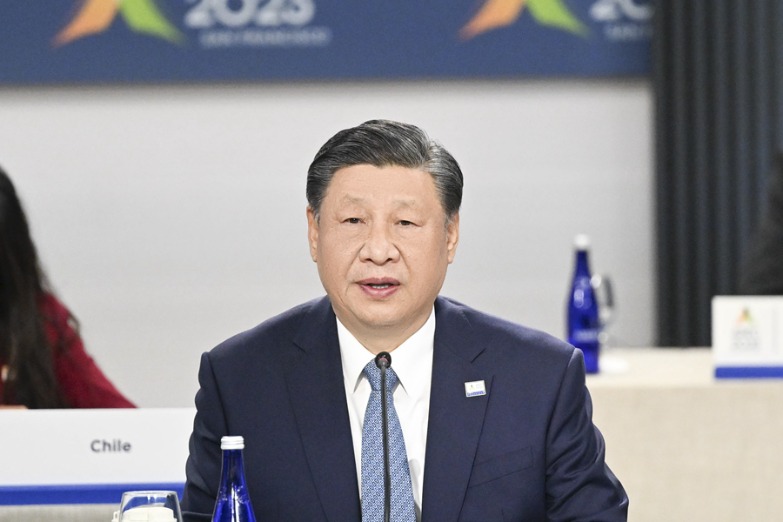
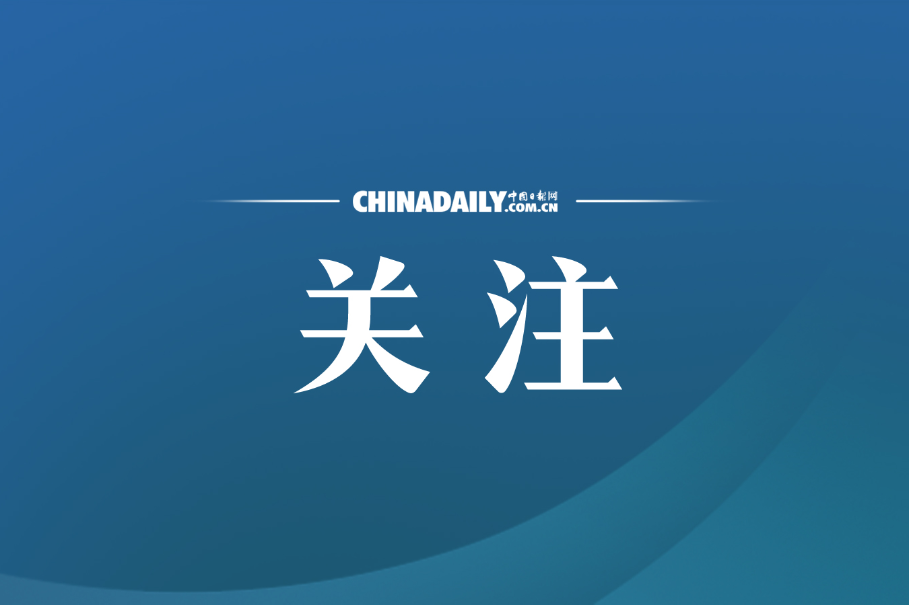
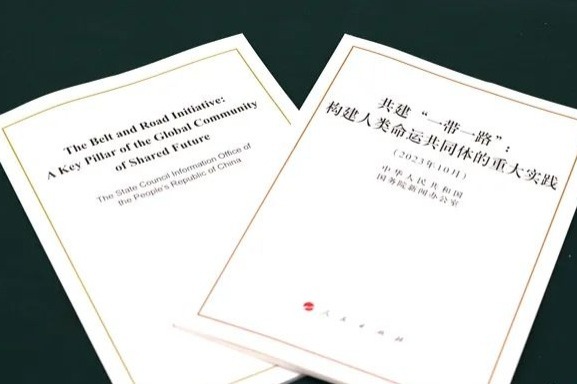
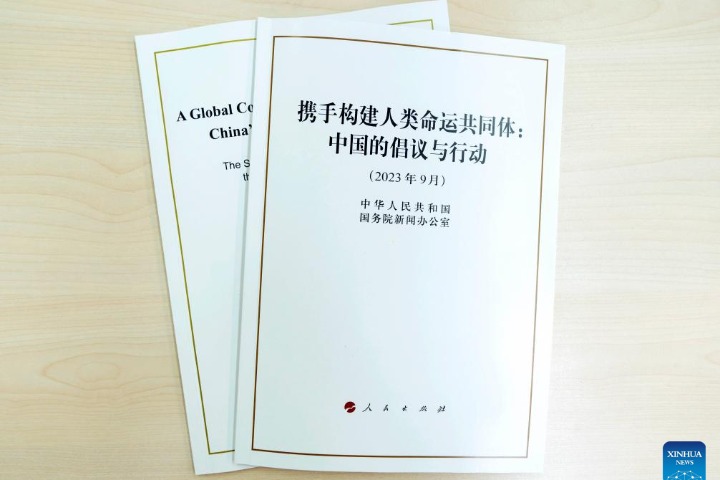
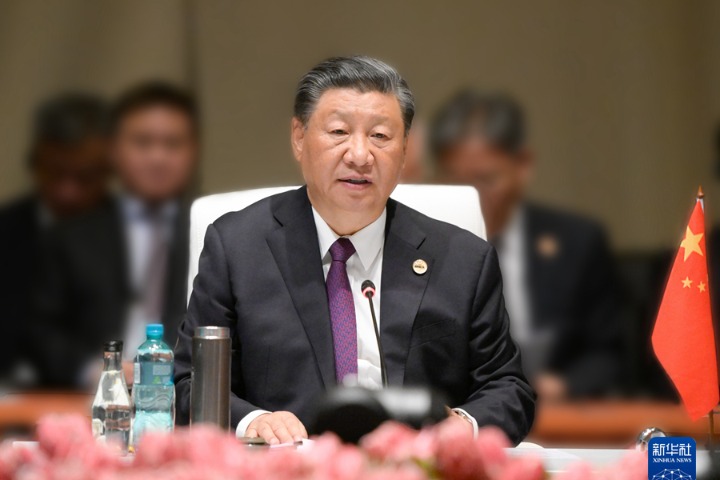



 英语点津微信
英语点津微信 双语小程序
双语小程序